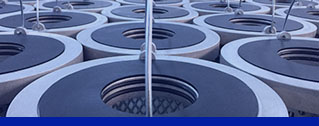
Filters are a small however vital a part of hydraulic equipment, although serving no mechanical function they're integral to the proper functioning of the machine and to prolonging the lively lifetime of the tools and the hydraulic fluid which drives it. The role of a filter is to take away and/or include particles of contamination and maintain the fluid that flows round the machine clear. Any contamination in the oil can cause harm to transferring components further downstream, and this could result in seizing up of shifting elements, corrosion of different components and costly replacements. When we consider the implications of not using a filter, the significance of those little gadgets becomes more important.
There are two major kinds of hydraulic oil filter – floor and depth filters. The surface filter, because the title suggests, removes contamination from the floor of the oil and could also be helpful in applications the place gravity feeds the oil by a space appropriate for such a filter during operation. A depth filter will be submerged in a reservoir or chamber and will take away particles from the whole thing of the body of fluid. Depth filters due to this fact, are more effective and can retain a bigger amount of contamination and undesirable particles earlier than they have to be cleaned or changed.
The supplies used to make hydraulic filters varies, as does the fee accordingly. Glass filters are more expensive but they're extra efficient, especially when glass fibres are used in a depth filter. Glass can be non-reactive, meaning it can be used with any kind of hydraulic fluid. Steel filters are also fairly environment friendly, but they can't be used with all varieties of hydraulic fluid, on account of incompatibilities between sure hydraulic oils and some metals. The place it's applicable to use a metallic filter there may be the choice of a magnetic filter system, which works as a depth filter and makes use of a magnetic cost to draw steel particles that will have entered the fluid system. If the hydraulic equipment is used in metal working and fabrication then the chance of potential contamination being from metallic particles is high; magnetic filters will deal with this contamination while one other sort of filter can be utilized to deal with other types of air pollution.
Cellulose or paper will also be used to make a hydraulic fluid filter, but these have a brief life expectancy and want frequent substitute. They're cheaper than the other varieties, however could end up costing more in the long run, attributable to common downtime for substitute and the potential injury to machinery if they are not changed typically enough.
It may seem to be glass is your best option; regardless of costing just a little more it does the perfect job and will not want changing too often. The downside of a glass filter is definitely its strength as nicely; the superior filtering skill can truly result in a drop in stress, in the system, which is often undesirable. It is particularly necessary, therefore, to test how a drop in hydraulic system strain will have an effect on productivity and efficiency if you are contemplating switching to glass filters from one other material kind. Consider also whether this drop in strain is more likely to lead to pointless changes of strain relief valves, resulting in doubtlessly dangerous build ups of stress elsewhere.
The options of hydraulic oil filters do not finish after materials type and development, as there may be nonetheless the issue of scores and specs to contend with. All filters have an ISO 4406 score, and the lower the code of any given filter, the higher it's at eradicating contamination. Hydraulic filters may additionally have a beta ratio, which is the ratio of particles discovered upstream of the filter divided by the number found downstream. For beta ratios, the higher it is the better, and this can be used to offer a share for effectiveness.
It is also essential to examine that the movement rate of the filter is appropriate with the movement rate of the machinery it's for use in; too fast and the filter won't be able to effectively remove contamination, too gradual and it may grow to be clogged rapidly. The operational strain of the hydraulic system is also important, as the filter should be capable of withstand that power for a chronic period of time. The ultimate thing to check is that the filter could be connected to the tools, so test the port measurement of the filter and ensure https://tempofiltre.com/hava-filtresi-imalatcilari/ it's suitable with the machinery within the location it's to be fitted.
There is a lot to contemplate right here, but selecting probably the most suitable hydraulic fluid filter is an train that it is worth spending a while on, as it will possibly make a giant difference to the efficiency and lifespan of your hydraulic gear and save on downtime and substitute costs in the long term.